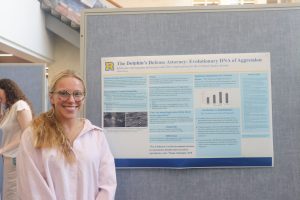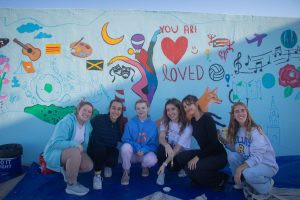The 28th Annual Zora Neale Hurston Festival of the Arts and Humanities events spanned over several days, bringing professors, activists, students, and community members together from across the country to discuss a wide range of topics based around their ongoing theme, “Communities of Color.” The first few days of lectures and discussions were based in Eatonville, Florida. Events in the Rollins College area convened from January 26 through 28. The festival banner hung proudly across the front of Mills, inviting the Rollins and surrounding Winter Park community to lectures and conversations about issues concerning race, education, politics, and other hot-button topics present in our society.
On Thursday, January 26, Rollins-located events began with a focus on “Civic Conversations Concerning 21st Century American Life in Communities of Color.” The day started after several opening remarks, one by our own Olin Library director, Jonathan Miller, and a morning presentation by Dr. Elenor Trayler, who spoke about the definition of community and how it influences our behavior. Afterwards, there were several breakout sessions throughout the day. A notable presentation was the Charles Blow, New York Times columnist, interview session. Alexandra Mariano ’17, after attending the welcome and interview events says, “I found the festival to be a… welcome source of new perspectives, all tying back in one way or another to Zora and Eatonville, a community right in our back yard. If we can’t look to our neighbors and our roots for inspiration, then where can we look?” The program also included a new feature to the festival: poster project presentations by select university students. The mentor that aided in the creation and presentation process enjoyed seeing the graduate student’s pride in their work and the smiles on their faces as they spoke to many community members, educating them on their respective topics.
The next day was centered around Communities of Color and Their Policing with all presentations in the St. Lawrence African Methodist Episcopal Church. One influential speaker was Dr. Khalil Gibran Muhammed, Harvard professor, who took a historical approach to how the African American community and police force have been in contact with each other since early in U.S. history. This helped set the groundwork for other presenter’s topics and ideas, including an insightful panel of mayors from historically black towns. Muhammed and other presenters proved “really powerful” in providing a historical and cultural perspective into our community today said Trent Tomengo, professor in the Department of Humanities, History, and Modern Languages at Seminole State College. He was also duly impressed with the optional play that night starring Elizabeth Van Dyke and Joseph Lewis Edwards: “Zora Neale Hurston: A Theatrical Biography.” This play came from New York City to Orlando for a one-night only performance to support the Zora Festival and The Association to Preserve the Eatonville Community Inc. “They really made it come alive,” states Tomengo.
Saturday, January 28 marked the last event of the festival, a wrap-up of the events and ideas brought up during the conference. Over a delicious assortment of pastries, coffee, and fruit to discuss what transpired over the past two days in the Bieberbach Reed conference room. Topics included the importance of citizen activism and issues facing the community today, especially in Trump’s America. When prompted to reflect on the festival, one woman explained how she was happy that people were willing to consider solutions to problems, not just hash-out issues. Being from the northwestern U.S., she remarked that many of the socio-economic issues that face her city, especially the lower-class, are similar throughout the nation—including Orlando. A professor talked about how he would alter his future classes to fit the new ideas and considerations he and others spoke about during the conference. These events clearly created an impact that will continue nation-wide as the scholars, students, and activists return to their home-states and begin new conversations. These new ideas and solutions will be sure to be discussed next year; plans are in the works for the next annual Zora Neale Hurston Festival.















Be First to Comment